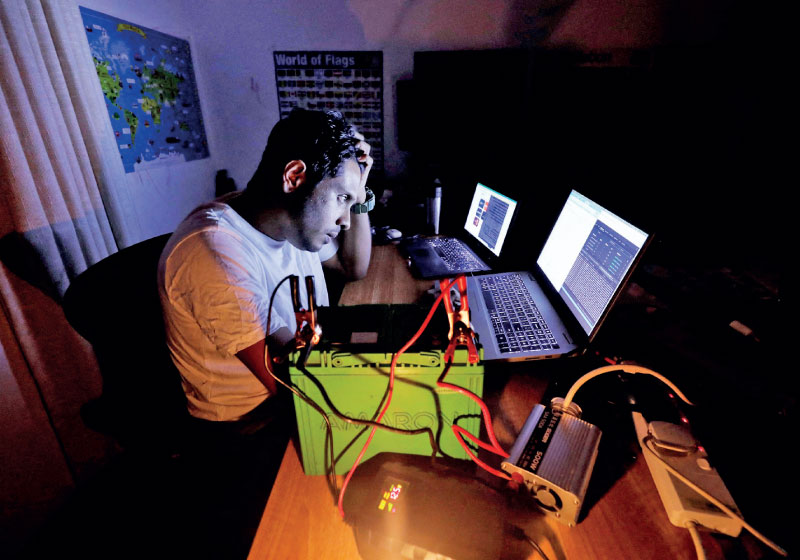Sunday Feb 15, 2026
Sunday Feb 15, 2026
Monday, 7 March 2022 03:21 - - {{hitsCtrl.values.hits}}

Amila Uduwerell, an IT officer who is home-based uses a car battery to charge his laptops as he works during the seven hours power outage, in Sri Lanka – Reuters
“No society can surely be flourishing and happy, of which the far greater part of the members is poor and miserable. Most government is by the rich for the rich. Government comprises a large part of the organised injustice in any society, ancient or modern.”
– Adam Smith –
“Capitalism is the extraordinary belief that the nastiest of men, for the nastiest of reasons, will somehow work for the benefit of us all.”
– John Maynard Keynes –
“The purpose of studying economics is not to acquire a set of ready-made answers to economic questions, but to learn how to avoid being deceived by economists.”
– Joan Robinson –
|
 Power cuts make life miserable. If you rely on a desktop computer as I do for news, Netflix, MS Word, and Windows, power cuts make misery into something painful called melancholy.
Power cuts make life miserable. If you rely on a desktop computer as I do for news, Netflix, MS Word, and Windows, power cuts make misery into something painful called melancholy.
In such a state of mind I called a friend on Friday 25 February who lives in Bambalapitiya. He told me that his electricity was not interrupted through the week. Another friend living in Kollupitiya confirmed that residents in Colombo 3 also shared this good fortune. In the not so mainstream but ‘must-read’ weekend paper ‘Anidda’ I read that residents of ‘Mirihana’ too are fortuitous enough to receive uninterrupted power.
Another friend living in a luxury high-rise close enough to Galle Face Green where he walks early mornings to appease his diabetic-induced aches and pains while gathering the latest updates from fellow walkers with access to the inner recesses in the world of commerce and industry told me that filling stations on Flower Road and Horton Place offer generous supply of fuel for State-owned vehicles and to the prominent and the privileged.
I thought this is all very unfair. It provoked me to revisit the writings of philosopher John Rawls who in his ‘Theory of Justice’ defined justice as fairness. Rawls says that justice is the first virtue of social institutions. “A theory however elegant and economical must be rejected or revised if it is untrue; likewise, laws and institutions no matter how efficient and well-arranged must be reformed or abolished if they are unjust. Each person possesses an inviolability founded on justice that even the welfare of society as a whole cannot override. In a just society, liberties of equal citizenship are settled and rights secured by justice are not open to pollical bargaining.”
John Rawls wasn’t commenting on Sri Lanka under the executive presidency.
I don’t envy the fortunate people who got uninterrupted power. Sooner than later they too will learn the haunting loneliness I experienced recalling happier times watching the pirouette of a candle flame with the incessant buzz of mosquitoes for company. These power cuts make people truly miserable and lonely.
Scot Fitzgerald said it succinctly. “The loneliest moment in someone’s life is when they are watching their entire world fall apart, and all they can do is stare blankly.” Come August I turn 80. I can reconcile myself to stare frankly at a world falling apart. But it pains. I have children and grandchildren whose worlds I do not wish to see unravel during my lifetime. The purpose of this essay is to understand how our society can so cosily and restfully coexist with brazen inequality, unfairness, and caprice.
I engage in this exercise in the hope that it will help me understand the egomaniacal mind and the outlandish conscience of the Minister who is reported to have run up an unpaid electricity bill amounting to Rs. 12 million. It contradicts the principle of justice as fairness. It underscores the parasitic purpose of our kind of politics.
The grave national crisis economic and social has made it an open season for economists and political commentators. Most ordinary people call it a curse. Opposition politicians call it a “heroes’ folly” inferring that while there were no easy solutions, wrong decisions have made what was a disaster into a catastrophe. Another Opposition leader made the curious remark that it was an “economic Armageddon”. It is doubtful that Homer would have nodded at that ‘cataclysmic inanity’!
This is really the season for economists. Those practicing the discipline as professionals, researchers, teachers and public thinkers are all agreed that it is a systemic problem demanding a grand economic reset.
|
One public thinker who earns my abiding respect for his ability to call a spade for what it truly is both in shape and purpose has suggested a common minimum program with the added caveat that we must first address the democratic deficit caused by the 20th Amendment – a prerequisite for any kind of a solution. That is common sense, eminent and accurate.
The 20th Amendment explains why affluent zones of the city get uninterrupted electricity while others had to experience the pain of the nation running out of fuel. Ours is a patrimonial state and patronage politics is how we run the country. Discretionary authority is abused.
The Pohottu monolith held its mass rally at Anuradhapura. As planned, it got the crowds. It reassured them that their machine works though it needed some heavy lubrication. Those who attended were not ordinary citizens. Generally solemn and listening, they were clients who turned up as ordered and arranged to listen to their patrons. I watched how the event got started. A cherubic prelate rejoiced at the size of the crowd and assured that great and miraculous changes were round the corner.
In the coming days the main Opposition group and its presidential aspirant will hold a rival display. Does it matter? The Z generation doesn’t take these Bob Hopes of hope seriously.
If there was even the faintest hope in the JVP-led Jathika Janabala Wegaya, those hopes evaporated when its leader sought an audience with the two monastic orders in Kandy.
One doesn’t begin a radical transformation declaring allegiance to the existing order.
Thomas Piketty the French Economist who is currently making waves with his scholarly research into social inequities and inequality caused by free market policies makes a point that came to my mind when I listened to this first speaker the Buddhist prelate at the Pohottu rally.
In his “Capital and Ideology” Piketty comes out with these remarkably familiar words. “Every human society must justify its inequities: unless reasons are found, the whole political and social edifice stands in danger of collapse.”
Now dear reader, do you realise how important it is to direct the most bizarre explanation, the most outlandish proposal as a kind of a plea to “Ape Hamudurwane”?
Our institutional religion is a vestigial remnant of the feudal order in the Kandyan kingdom. It has survived colonial rule as a convenient crutch of the colonial administrator. The pious land and mine owning gentry who succeeded the British appeased it with state patronage. The 1972 constitution invested it with a primacy that blurred the space between spiritual and temporal. In post-war Sri Lanka, it has flourished in a new role as arbiter between truth real and virtual.
As Thomas Piketty points out, “Every epoch therefore develops a range of contradictory discourses and ideologies for the purpose of legitimising the inequality that already exists or that people believe should exist.”
The grand reset when it gets started must not be confined to economic policy alone. The reset must be social, cultural and ideological.
In the midst of the crisis, we are in steady sure hands heading from nowhere to anywhere. Our policymakers have shown that they could grasp the nettle in double quick time. Take the issue of garbage and crows. A garbage dump should not be located near the airport. Quite apart from the stench, it would attract craven birds hazardous to aircraft. Hegel had his owl of Minerva. Our profundo offers his bird of choice.
As Thomas Paine said, “The sublime and the ridiculous are often so nearly related, that it is difficult to class them separately. One step above the sublime makes the ridiculous, and one step above the ridiculous makes the sublime again.” Anyone following the proceedings in our parliament in these dark times could not seriously disagree with Thomas Paine.
|
Our problem is simple. We do not have a precise idea about what justice means. That includes all do-gooders with blind allegiance to the virtues of a free market. The great economic reset or the structural transformation or the common minimum program must be aimed at social justice in the form of Rawlsian fairness.
As I said earlier this is the season for economists. I am not an economist although I am interested in the subject. In 1971 I read Gunnar Myrdal’s Asian Drama. Its three volumes are well-preserved on my bookshelf.
Myrdal was writing in the ’60s. He comments on then Ceylon. “Unlike articulate Indians, the Ceylonese intelligentsia think it ridiculous to set broad goals and ideals. Along with this attitude goes a lack of political responsibility. As the amazingly uninhibited parliamentary debates make it plain, politics is pursued as a game – without restrictive rules – where arguments have their main value in winning a point or hurting an adversary. When one is disheartened by the Indian propensity towards double thinking a good antidote is to consider where extreme cynicism has led Ceylon.” (Asian Drama Vol 1 P 357)
Myrdal observes wryly that Ceylon’s “radical nationalism although imbued with vague socialism was more concerned with jobs than with ideology.” Patronage politics driven by pure unvarnished cynicism seems to be our history as well as destiny. Now it looks like our buccaneer billionaires are emerging from the shadows with simple solutions to complex conundrums. We seem to be confused about entrepreneurship. Running distilleries, casinos and elite money lending as financial services don’t create wealth.
That brings me to another book on my shelf that I really treasure – Professor Joan Robinson’s “Economic Philosophy”, a Penguin Pelican book of 140 pages. Professor Robinson advises you to learn economics not to practice it but to understand what the economists tell you.
Not being an economist, not claiming any in-depth grasp of this ‘dismal science’ called economics, I would regard her as one of the greatest economists of the 20th century. She was a fearlessly probing critic of free-market capitalism. At her time, she was a revered economist who extensively studied and commented on international trade and development. She did visit Sri Lanka in the ’50s.
Professor Joan Robinson differentiated between value and values. Economic values and human values are not necessary the same – a truth that escapes the doctrinaire free marketers.
In this slim volume “Economic Philosophy”, Professor Joan Robinson maintains that there are values embedded in all economic decisions. “Economics has always been a vehicle for the ruling ideology of each period as well as partly a method for scientific investigation.” Quite apart from the blackhole we are in, any reset must necessarily follow a broad consensus on a secular national ideology.
Those kind people who seek solutions to the current impasse should also listen to Mark Carney who after his stint as governor of Bank of England is now serving the United Nations as special envoy on climate and finance.
The man who served as governor of two G7 reserve banks says today, “We are living Oscar Wilde’s aphorism – knowing the price of everything but the value of nothing – at incalculable costs to our society.”
Mark Carney’s BBC Reith lecture from Moral to Market Sentiments can be listened to at https://www.bbc.co.uk/programmes/m000py8t.